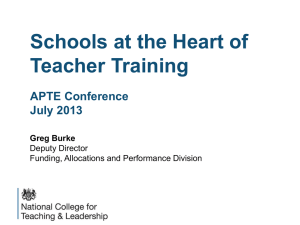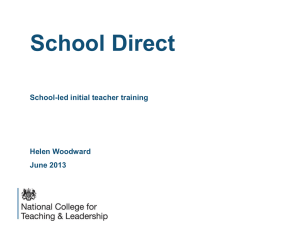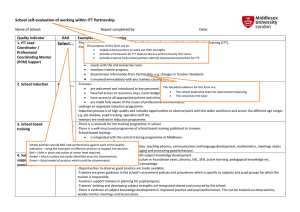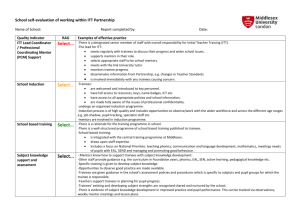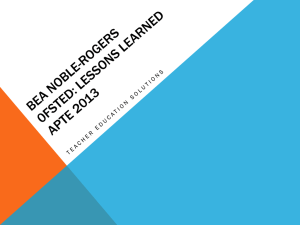TA Template (Arial) v1.0 April 2012
advertisement
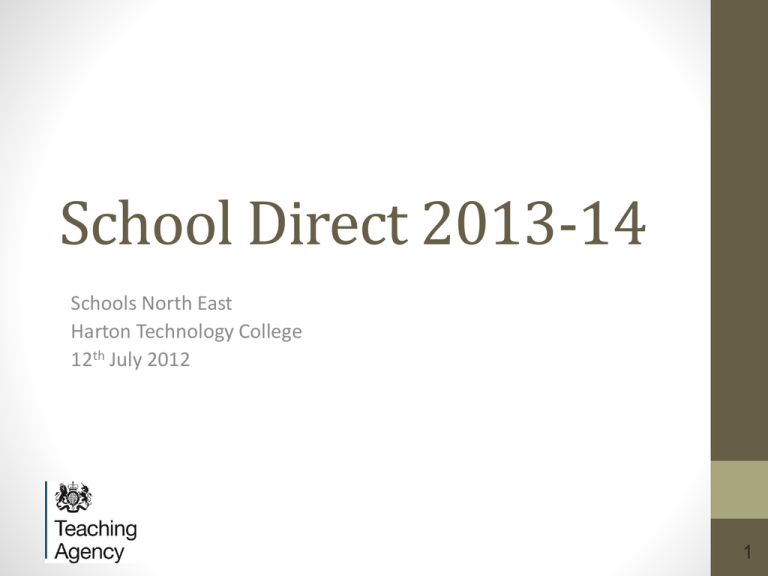
School Direct 2013-14 Schools North East Harton Technology College 12th July 2012 1 Today’s session will cover.. What is School Direct? • • • • • Requesting places Training Funding, fees and bursaries Recruitment of trainees – school experience programme Employment Timescales Further information and local help and support What is School Direct? • School Direct is an opportunity for schools to influence the way in which initial teacher training (ITT) is delivered by creating more school-led training programmes that better meet the needs of schools and trainees. • Schools will be able to recruit and select the trainees that best meet their and their partnership needs, with the expectation that those teachers will go on to work in the group of schools where they trained. • The aim is to introduce choice into the ITT system by enabling schools to negotiate with their chosen ITT provider how they wish to use their School Direct place(s); the training programme which will be delivered and the funding they receive from the provider. School Direct Programmes • The School Direct Training Programme • Open to all graduates • Funded by tuition fees paid by the trainee • Trainees with a 2:2 or above are entitled to a bursary • The School Direct Training Programme (salaried) • Employment-based route into teaching • For high quality graduates with 3 or more years’ career experience • Trainee employed as an unqualified teacher by a school • Teaching Agency provides funding which the school can use to subsidise the trainee’s salary and/or training. • Replaces the GTP from 2013-14. Requesting places • Expressions of interest – until 7th September 2012 • Complete the online registration form which can be found here: http://www.education.gov.uk/schools/careers/traininganddevelo pment/initial/b00205704/school-direct/register-interest. • Information needed: • School contact, school name and URN, number of schools in consortium, School Direct salaries and/or non salaried route, phase of places to be requested. • Places by phase and subject – 7th Sept to 28th Sept 2012 • Schools can request places in specific phases and subjects through a lead school from 7 September 2012 until 28 September 2012 inclusive. Places will be allocated and the TA will correspond with the group of schools through the lead school. Requesting and receiving places • School Direct is demand-led and schools should request subjects and phases where employment need is greatest. The TA will prioritise requests according to subject and phase to reflect national priorities and will need to work within the total number of places. The TA will also apply a number of criteria when considering requests for places. The main criteria will be: school quality, trainee quality, national priority subjects, cohort size and recruitment record. Further details can be found in section 1 of the guide to School Direct. Training • Schools choose which accredited ITT provider to work with – can be a HEI-led (university) or school-led (SCITT). • School and ITT provide negotiate how the training is structured and agree who will do what and how the funding will be divided to reflect this. • The respective roles and responsibilities should be set out in a partnership agreement between schools and the ITT provider. • Provider is accountable and responsible for the recommendation of the award of qualified teacher status (QTS) – important as the school direct trainees will be included in any provider Ofsted inspection and monitoring. Funding, fees and bursaries • The School Direct Training Programme • Funding is through tuition fees paid by the trainee directly to the accredited ITT provider. • Trainees will be entitled to bursaries as per the table below, with: • Uplift of 25% if in a school with > 25% FSM • Uplift of £2,000 if becoming a primary teacher specialising in teaching mathematics General science and non-priority secondary Degree classification Secondary maths, Other priority physics, secondary and chemistry, primary modern languages 1st class 20,000 9,000 0 2:1 15,000 5,000 0 2:2 12,000 0 0 Funding, fees and bursaries • The School Direct Training Programme (salaried) • Places funded through the Teaching Agency to subsidise salary and training costs. • Funding rates reflect the priorities of the subject and location of the employing school. • Funding rates in table below: National Inner London Outer London Fringe FSM < 35% High priority subject Other priority subject Primary non-specialist Primary maths specialist 19,000 14,000 14,000 16,000 23,900 17,600 17,600 20,100 22,600 16,600 16,600 19,000 20,200 14,900 14,900 17,100 FSM > 35% High priority subject Other priority subject Primary non-specialist Primary maths specialist 20,900 15,400 15,400 17,600 26,300 19,400 19,400 22,100 24,800 18,300 18,300 20,900 22,300 16,400 16,400 18,800 Secondary subject groups Secondary High Priority Physics, maths, chemistry and modern languages Secondary Other Priority Art and design, technology, economics, engineering, English, dance, drama, geography, history, information and communications technology, computer science, classics, music, biology, PE and RE. Secondary Non Priority Applied business, applied science, business studies, citizenship, general or combined science, health & social care, leisure & tourism, media studies, psychology, social sciences (except economics) Recruitment of trainees • Schools can recruit locally through their own recruitment processes, work with their ITT provider to use its marketing and recruitment processes, or use a combination of the two. • Recruitment processes should be high quality, open and transparent and will be subject to inspection by Ofsted. • Schools should take the lead in interviewing and selecting candidates, but all School Direct candidates must meet the standard entry requirements of the school’s chosen provider, and be approved by the provider. • Schools should ensure candidates for the School Direct Training Programme are fully aware of the fees they are likely to be charged. School Experience Programme 2011-12 • Secondary only: priority subjects of maths, physics, chemistry and MFL • Trainees: 1st, 2:1 or 2:2 degree in the subject • Placement duration: from 1 to 10 days • Placements to include: • Observation of teaching in their subject and pastoral work, and • An opportunity to talk to teachers about day to day life in a school Placement Day Amount paid to school per day Amount paid to participant Day 1 £50.00 n/a Days 2-5 £25.00 n/a Days 6-10 £15.00 £20 per day Employment after training • Prior to requesting places, schools are expected to: • Review their previous employment patterns and use any current knowledge on staffing/budgetary issues to make an assessment of future need. • This assessment should enable schools to request a number of places which broadly matches the future employment requirements within the school/partnership of schools. • The schools(s) is expected to have a clear capacity to employ the trainees when they successfully complete their training programme. • Throughout the process, schools should be aiming to employ trainees at the end of their training, barring any circumstances which prevent this e.g. changes to school structure. Timescales • 14 June to 7 September 2012 – Schools register interest in School Direct. • 7 to 28 September 2012 – Lead schools request places by phase and subject . • Mid-October (date tbc) – Allocations agreed and announced. • End of October (date tbc) – Recruitment opens for schools. Further information • Associated resources http://www.education.gov.uk/schools/careers/traininganddevelopment/initial/b00205704/sch ool-direct/schools • • • • • • • • A guide to School Direct 2013-2014 A guide to School Direct 2013-2014 Ofsted: Search for inspection reports Online access to school inspection reports conducted by Ofsted. Performance profiles for ITT providers Reviews of the teacher training institutions in England. Training our next generation of outstanding teachers - Implementation plan Case studies from 2012-13 http://www.education.gov.uk/schools/careers/traininganddevelopment/initial/b00205704/school -direct/sdcasestudies-sch • FAQs http://www.education.gov.uk/schools/careers/traininganddevelopment/initial/b00205704/school -direct/sdfaqs1 • Secondary School Experience Programme http://www.education.gov.uk/schools/careers/traininganddevelopment/initial/a00205899/sep • Primary School Experience Programme http://www.education.gov.uk/schools/careers/traininganddevelopment/initial/b00210494/pep • Teaching Agency Professional Delivery Lead – North East • Kim Mitchell kim.mitchell@education.gsi.gov.uk 07717 865287 Any questions?
